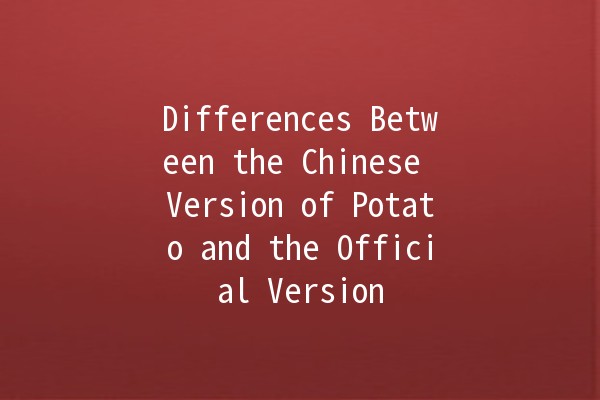In the realm of digital applications, the availability of localized versions plays a crucial role in user engagement and satisfaction. This is particularly true for popular applications such as Potato, a wellknown productivity app that has garnered significant attention worldwide. Understanding the differences between the Chinese version and the official international version can enhance user experience and provide insights into which version may be better suited for your needs. This article explores these distinctions in detail, delving into features, performance, user interface, and more, while also providing productivity tips for maximizing your use of the app.
Overview of Potato: The App for Productivity
Potato is an innovative productivity application that helps users manage tasks, plan schedules, and optimize their efficiency. Its userfriendly design and versatile functionalities make it appealing to a broad audience. Both the Chinese and official versions aim to enhance productivity, but there are noteworthy differences that stem from localization and cultural adaptation.
Key Differences Between the Chinese and Official Versions of Potato
One of the most apparent differences lies in the language. The Chinese version of Potato is fully localized, not only in terms of language but also through the use of culturally relevant vocabulary and idioms. This is crucial for native speakers, as it makes the app more intuitive and userfriendly. Conversely, the official version primarily utilizes English, which may not resonate as well with Chinese users.
While both versions strive to maintain core functionalities, the Chinese version often includes additional features tailored to the local market. For instance, it may integrate local payment methods, allowing for smoother transactions within the app. Additionally, certain features may emphasize social sharing, reflecting the collectivist culture prevalent in China.

User interface (UI) design can vary drastically between cultures. The Chinese version of Potato often embraces vibrant colors and dynamic icons, aligning with local design trends. In contrast, the official version may adopt a more minimalist approach, which is common in Western design philosophies. This difference in aesthetic appeal can impact user comfort and ease of navigation.
The Chinese version is likely to have more robust community features, capitalizing on the high social media usage in China. Users might find integrated features that allow for team collaboration or social interaction, encouraging group productivity. The official version may offer basic sharing options but typically lacks the depth found in the Chinese counterpart.
Availability of customer support can significantly affect user satisfaction. The Chinese version may provide support in Mandarin, offering localized help articles and a responsive customer service team. In contrast, the official version may limit its support to Englishspeaking users, resulting in potential challenges for nonEnglish speakers.
Five Productivity Enhancement Tips for Using Potato
Using Potato effectively can significantly boost your productivity. Here are five tips to help you maximize the app's potential:
Tip: Begin by setting SMART (Specific, Measurable, Achievable, Relevant, Timebound) goals within the app.
Example: Instead of saying, “I want to finish my project,” specify, “I will complete the first draft of my project report by Friday at 3 PM.” This clarity helps track progress and maintain motivation.
Tip: Use Potato's task prioritization features to identify and focus on highimpact tasks.
Example: Mark tasks as high, medium, or low priority based on urgency and importance. This helps you tackle critical tasks first, ensuring deadlines are met.
Tip: Integrate your calendar with Potato to streamline your scheduling process.
Example: Syncing with a digital calendar allows you to see all appointments and deadlines in one place, preventing overscheduling and enhancing time management.
Tip: If using the Chinese version, make use of the community and collaborative features to share tasks and ideas.
Example: Create team projects where multiple users can contribute, ensuring everyone is on the same page and facilitating easier communication among team members.
Tip: Dedicate time weekly to review your completed and pending tasks.
Example: Create a status report within the app that summarizes your progress, highlights areas for improvement, and sets goals for the following week. This reflection fosters growth and accountability.
Common Questions Regarding Potato Versions
What Are the Main Benefits of Using the Chinese Version of Potato?
The Chinese version offers enhanced localization, including language, cultural elements, and features that cater specifically to Chinese users, enhancing the overall user experience.
Is the Official Version of Potato Available in Languages Other Than English?
The official version primarily supports English. However, some features may be accessible in other major languages, depending on the user’s settings and geographical location.
How Does the Performance of Each Version Compare?
Performance can vary based on device compatibility and regional server access. Users have reported that the Chinese version tends to load faster in local areas due to optimized server configurations.
Can Users Switch Between Versions?
Currently, users cannot switch between the Chinese and official versions seamlessly. It involves downloading a different version from the app store, requiring a fresh installation.
Are There Any Subscription Differences Between the Two Versions?
Pricing structures may differ based on regional pricing strategies and available features. Users are encouraged to check the app store for specific details related to subscriptions.
What Should I Choose if I’m Not Fluent in Mandarin?
For nonMandarin speakers who still want to benefit from Potato, the official version might be more appropriate. However, users can explore apps or tools that help bridge the language barrier while using the Chinese version.
Engaging with apps like Potato can significantly enhance your productivity while catering to your unique requirements. By understanding the differences between the Chinese version and the official version, users can make informed choices that align with their individual preferences and needs. Happy productivity!